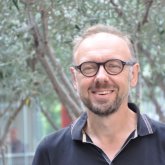Background
The research goal of the Sustainable Polymer Chemistry (SPC) group is to synthesize polymeric materials, additives, and nanocarriers based on renewable resources or with defined end-of-life options (e.g. biodegradation). Our research relies on the designed synthesis of novel monomer and polymer building blocks or utilizes chemically-modified biopolymers. To address the scientific questions, we use a combination of experimental techniques including organic synthesis, living polymerization techniques, or emulsion formulations. We also use state-of-the-art characterization techniques for polymers and study their polymerization kinetics in detail to control macromolecular function and assembly. Biodegradation or interaction with biological media is also studied for selected materials.
The group is part of the MESA+ Institute for Nanotechnology, which offers advanced characterization and fabrication tools on the nanoscale, as well as a stimulating environment with more than 250 PhD students working on various aspects of nanoscience and technology.
Job description
The Research Technician will be involved in current research topics and will synthesize new building blocks for sustainable polymeric materials, including organic syntheses, and different polymerization techniques. The employee will also be involved in characterization techniques and maintenance of equipment, such as gel permeation chromatography, or working with biological materials.
Information and application
Are you interested in this position? Please send your application via the 'Apply now' button below before 25-08-2025, and include your CV and motivation letter.
For more info please visit our website https://www.utwente.nl/en/tnw/spc/ or contact the secretariat of the Department Molecules and Materials, or Prof. Dr. Frederik Wurm, e-mail: frederik.wurm@utwente.nl or spc-tnw@utwente.nl
Screening can be part of the procedure.
About the department
The “Sustainable Polymer Chemistry“ (SPC) Group is embedded in the Department of Molecules and Materials at the Universiteit Twente in the Faculty of Science and Technology. SPC is also a member of the MESA+ Institute and the Polymer Center Twente (PCT).
With a major focus on the design and formulation of macromolecules, the interdisciplinary SPC team focuses on developing new sustainable polymeric materials with a focus on the synthesis of new molecules.
The SPC group develops novel synthesis strategies and polymeric materials to tackle fundamental questions. The main focus of the group is novel (bio)degradable and chemically modified biobased materials, primarily based on phosphorus-containing polymers or biopolymers, such as starch, cellulose, or lignin.
We combine several state-of-the-art technologies to produce smart materials for drug delivery, agriculture, adhesive or separation technologies, flame retardants, and optics – always based on the molecular control of macroscopic properties.
The expertise of our interdisciplinary team combines modern organic and inorganic chemistry with precision polymer synthesis and colloidal formulations (miniemulsion, reactions at the interface, etc.), polymer brushes, polymer processing (foaming, 3D printing, etc.) with molecular characterization and precise imaging techniques (especially atomic force microscopy) to complement the materials preparations.
About the organisation
The Faculty of Science & Technology (Technische Natuurwetenschappen, TNW) engages some 700 staff members and 2000 students in education and research on the cutting edge of chemical technology, applied physics and biomedical technology. Our fields of application include sustainable energy, process technology and materials science, nanotechnology and technical medicine. As part of a people-first tech university that aims to shape society, individuals and connections, our faculty works together intensively with industrial partners and researchers in the Netherlands and abroad, and conducts extensive research for external commissioning parties and funders. Our research has a high profile both in the Netherlands and internationally and is strengthened by the many young researchers working on innovative projects with as doctoral candidates and post-docs. It has been accommodated in three multidisciplinary UT research institutes: Mesa+ Institute, TechMed Centre and Digital Society Institute.





